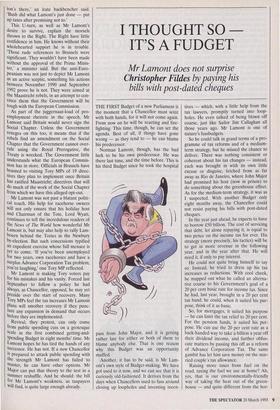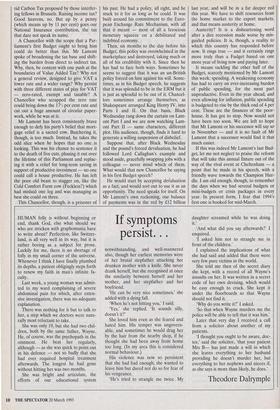I THOUGHT SO IT'S A FUDGET
Mr Lamont does not surprise
Christopher Fildes by paying his
bills with post-dated cheques
THE FIRST Budget of a new Parliament is the moment that a Chancellor must seize with both hands, for it will not come again. From now on he will be reacting and fire- fighting. This time, though, he can set the agenda. Best of all, if things have gone wrong — as they tend to — he can blame his predecessor.
Norman Lamont, though, has the bad luck to be his own predecessor. He was there last time, and the time before. This is his third Budget since he took the hospital pass from John Major, and it is getting rather late for either or both of them to blame anybody else. That is one reason why this Budget was an opportunity muffed.
Another, it has to be said, is Mr Lam- ont's own style of Budget-making. We have got used to it now, and we can see that it is curiously old-fashioned. It derives from the days when Chancellors used to fuss around closing up loopholes and inventing incen- tives — which, with a little help from the tax lawyers, promptly turned into loop- holes. He even talked of being blown off course, just like Sailor Jim Callaghan all those years ago. Mr Lamont is one of nature's fussbudgets.
So he could talk in grand terms of a pro- gramme of tax reforms and of a medium- term strategy, but he missed the chance to deliver. There was nothing consistent or coherent about his tax changes — instead, each was brought in with its own little excuse or disguise, fetched from as far away as Rio de Janeiro, where John Major had promised his host (now in prison) to do something about the greenhouse effect. As for the medium-term strategy, it was as I suspected. With another Budget only eight months away, the Chancellor could not resist paying his bills with post-dated cheques. In the year just ahead, he expects to have to borrow £50 billion. The cost of servicing that debt, let alone repaying it, is equal to two pence on the income tax for ever. His strategy (more precisely, his tactics) will be to get in more revenue in the following year, and in the year after that. He will need it, if only to pay interest.
He could not quite bring himself to say so. Instead, he tried to dress up his tax increases as reductions. With cool cheek, he mapped out what he called an alterna- tive course to his Government's goal of a 20 per cent basic rate for income tax. Since he had, last year, brought in a 20 per cent tax band, he could, when it suited his pur- pose, think of it as basic.
So, for mortgages, it suited his purpose — he can limit the tax relief to 20 per cent. For the pension funds, it suited his pur- pose. He can use the 20 per cent rate as a back-handed way to take a billion a year off their dividend income, and further obfus- cate matters by passing this off as a reform of Advance Corporation Tax. The same gambit has let him save money on the mar- ried couple's tax allowance.
Raising more taxes from fuel on the road, taxing the fuel we use at home? Ah, yes, that is our environmentally-friendly way of taking the heat out of the green- house — and quite different from the hor- rid Carbon Tax proposed by those interfer- ing fellows in Brussels. Raising income tax? Good heavens, no. But up by a penny (which means up by 11 per cent) goes our National Insurance contribution, the tax that dare not speak its name.
A Chancellor with the scope that a Par- liament's first Budget ought to bring him could do better than this. Mr Lamont spoke of broadening the tax base and shift- ing the burden from direct to indirect tax. Why, then, be content with one push at the boundaries of Value Added Tax? Why not a general review, designed to give VAT a lower rate and a wider range? Why persist with three different states of play for VAT — zero-rated, exempt and taxable? A Chancellor who scrapped the zero rate could bring down the 17"2 per cent rate and cut out a huge amount of circular paper- work, while he was at it.
Mr Lamont has been consistently brave enough to defy his party's belief that mort- gage relief is a sacred cow. Butchering it, though, is too much. Instead, he takes the odd slice when he hopes that no one is looking. This was his chance to sentence it to the death of five cuts, phasing it out over the lifetime of this Parliament and replac- ing it with a relief for long-term saving in support of productive investment — no one could call a house productive. He has left the poor old beast to stagger on, like the Cold Comfort Farm cow (Feckless?) which had mislaid one leg and was managing as best she could on three.
This Chancellor, though, is a prisoner of his past. He had a policy, all right, and he stuck to it for as long as he could. It was built around his commitment to the Euro- pean Exchange Rate Mechanism, with all that it meant — most of all a ferocious monetary squeeze on a debilitated and indebted economy.
Then, six months to the day before his Budget, this policy was overwhelmed in the marketplace and destroyed, taking much or all of his credibility with it. Since then he has had to face both ways. Sometimes he seems to suggest that it was an un-British policy forced on him against his will. Some- times, as in his Budget speech, he suggests that it was splendid to be in the ERM but it is just as splendid to be out of it. Chancel- lors sometimes arrange themselves, as Shakespeare arranged King Henry IV, into Parts I and II. On that basis, Black Wednesday rang down the curtain on Lam- ont Part I and we are now watching Lam- ont Part II — same characters, different plot. His audience, though, finds it hard to generate a willing suspension of disbelief.
Suppose that, after Black Wednesday and the pound's forced devaluation, he had followed Lord Callaghan's example and stood aside, gracefully swapping jobs with a colleague — never mind which of them. What would that new Chancellor be saying in his first Budget speech?
He would start by accepting ddaluation as a fact, and would sort out to use it as an opportunity. The need speaks for itself. On Mr Lamont's own reckoning, our balance of payments was in the red by £12 billion last year, and will be in a far deeper red this year. We have to shift resources from the home market to the export markets, and that means austerity at home.
Austerity? It is a disheartening word after a dire recession made worse by mis- guided policies. It is, though, a reality to which this country has responded before now. It rings true — and it certainly rings more truly than a Fudget based on one more year of living now and paying later.
It means tackling the other half of the Budget, scarcely mentioned by Mr Lamont this week: spending. A weakening economy has had to carry an ever-increasing burden of public spending, for the most part unproductive. Even in the year ahead, and even allowing for inflation, public spending is budgeted to rise by the thick end of 4 per cent. These are the finances of the poor- house. It has got to stop. Now would not have been too soon. We are left to hope that Mr Lamont or his successor will say so in November — and it is no fault of Mr Lamont that a successor would find it that much easier.
If this was indeed Mr Lamont's last Bud- get, let me not neglect to praise the reform that will take this annual fixture out of the way of the rival event at Cheltenham — a point that he made in his speech, with a friendly wave towards the Champion Hur- dle. I am old enough, though, to remember the days when we had several budgets or mini-budgets or crisis packages in every year. In present form, I fear that 1994's first one is booked for mid-March.



























































 Previous page
Previous page